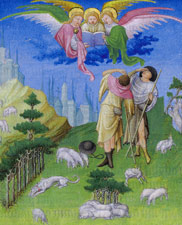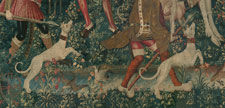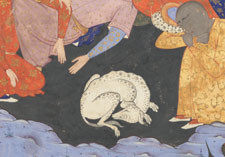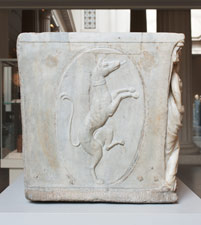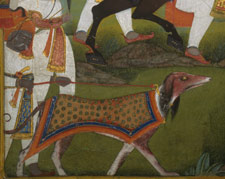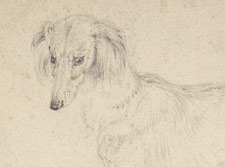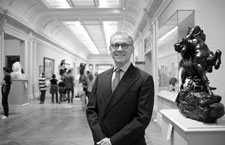New Connections appear every Wednesday. Sign up for a reminder.
Nineteenth-century, modern, and contemporary art curator Gary Tinterow describes the joys of being a long-term greyhound owner.
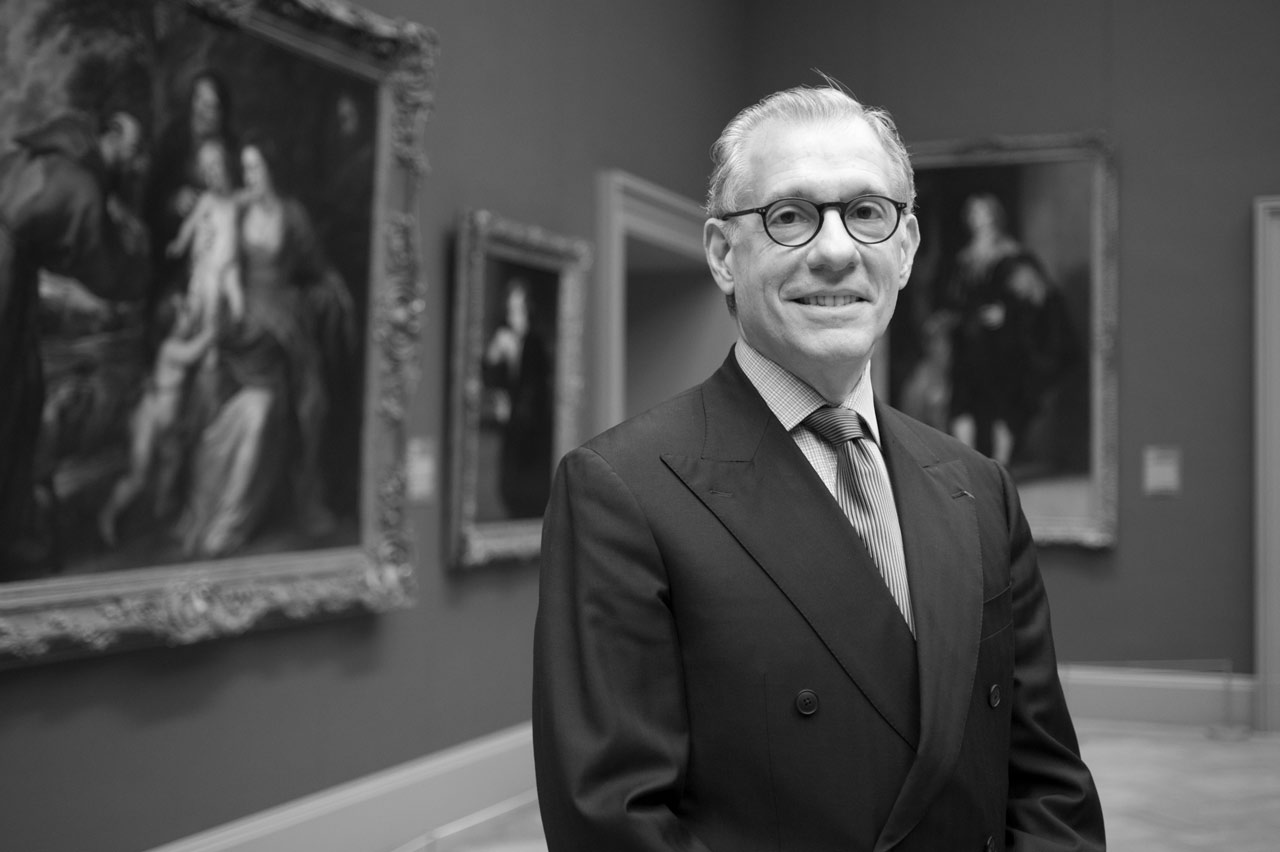 1280852
1280852 1280774
1280774 7261024
7261024 8291024
8291024 1280836
1280836 11021024
11021024 1280613
1280613 11291024
11291024 1280648
1280648 1280823
1280823 9181024
9181024 6051024
6051024 1280990
1280990 1280913
1280913 1280948
1280948 7771024
7771024 1187828
1187828 1280839
1280839 1280852
1280852 9161024
9161024 6001024
6001024 4801024
4801024 1280966
1280966 6721024
6721024 11261024
11261024 12801016
12801016 1280930
1280930 1280929
1280929 1227913
1227913 1280825
1280825
My name is Gary Tinterow, and I'm head of the department of nineteenth-century, modern, and contemporary art here at The Metropolitan Museum of Art. I've had the pleasure of living with greyhounds for more than twenty years now.
The greyhound is the only species of dog that appears unchanged in western
art, from nearly five thousand years ago to the present. It's clearly one of the oldest breeds of dogs
and it's certainly the best. I've had three greyhounds, and I get them through adoption agencies, and
they come from the track. Greyhounds are the second-fastest mammal on earth, exceeded only slightly by a cheetah.
And they run in more or less the same way. They're not being propelled forward by their legs so much
as by their very flexible spines, which are contracting.
Greyhounds were used to hunt in a very particular way. Although they could catch
a small rabbit or a squirrel, or a rat in Central Park, the way they brought down
large game was by chasing it so long and so fast that the animal would become overheated
essentially have a heart attack, and then it was the hunter's job to come along and give it the coup de grâce.
Now I'm on my third greyhound, Emma. They're very personable and social dogs. They have huge hearts, not just an emotional heart, but large, pumping hearts, huge lungs
very rich blood, they have something like ten per cent more blood cells than other dogs. They're not prone to diseases, and they often live, as mine have, to fifteen years.
Because of their odd physiognomy, greyhounds have very funny poses.
When they sit, their chest always bottoms out, and their hind legs are up in the air quite high.
They can make themselves very, very small, curled up like a ball
less than two-and-a-half feet in diameter, or stretch out
six feet from one end to the other when they're lying on your bed. But, the most comical pose, and only a greyhound owner would typically see this because they have to be extremely relaxed
is when they're on their back, with all four legs straight up in the air
like Snoopy on top of his doghouse. And, in fact, that's the most comfortable pose.
They are leaners. They express affection by leaning against the person whom they want to relate to. This greyhound is said to have saved the life of the duke of Richmond during a boar hunt.
When John Singer Sargent wanted to make a rich American heiress appear noble, to our left was to have been a greyhound. But the greyhound was no longer available for posing, and so her husband was a poor substitute, I'm sure, for the noble dog that's no longer visible.
It's hard to know which came first, the greyhound, or the concept of elegance. People began to dress and look like their dogs, and dogs
began to be bred in order to look like their owners. Attenuation became synonymous with elegance.
And I remember the first time that I walked my very first adopted greyhound, Elliot, on Fifth Avenue, a woman in a very extravagant fur coat came up and said
"What a beautiful dog, so thin, so elegant."
I'm sure the reason I love greyhounds is because I associate them with the art that I love. But all dogs
love their masters, and any dog is adorable.
There's nothing particular about the greyhound when it comes to affection from its
human companion.
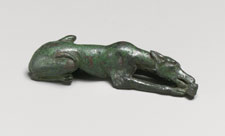 |
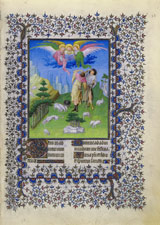 |
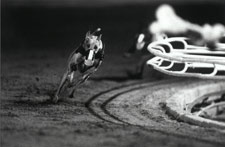 |
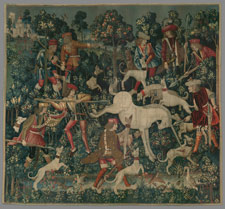 |
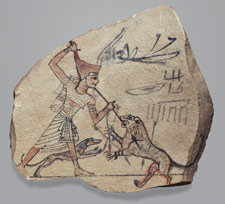 |
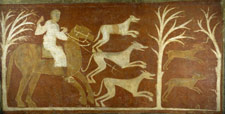 |
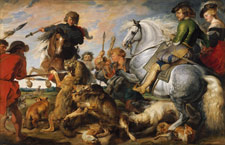 |
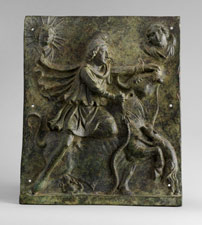 |
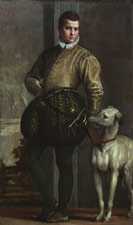 |
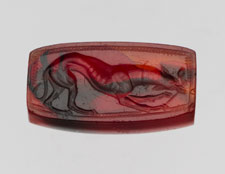 |
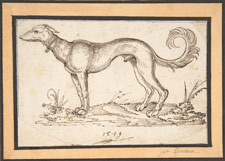 |
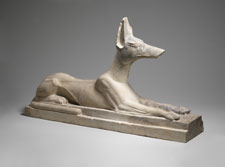 |
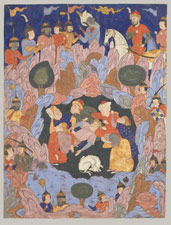 |
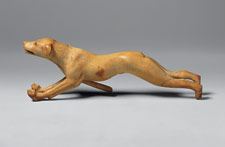 |
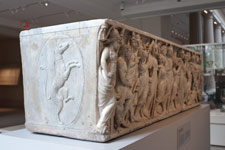 |
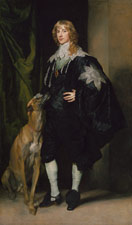 |
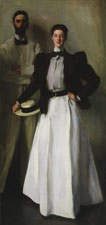 |
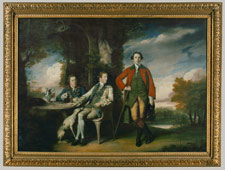 |
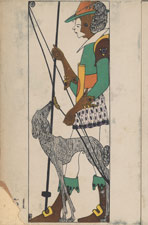 |
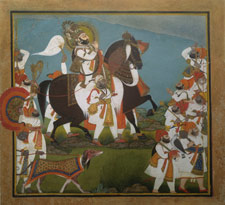 |
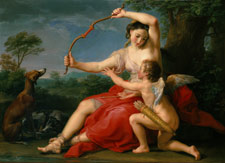 |
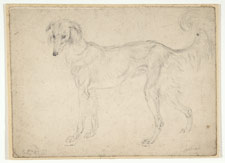 |
Works of art in order of appearanceLast Updated: June 22, 2015. Not all works of art in the Museum's collection may be on view on a particular day. For the most accurate location information, please check this page on the day of your visit. |
||
 |
Bronze statuette of a hound gnawing a bone 3rd–2nd century b.c.; Hellenistic Greek Bronze Fletcher Fund, 1936 (36.11.12) More information: The Collection Online Not on view
|
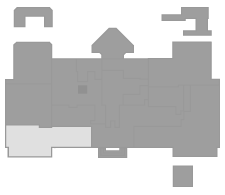 Greek and Roman ArtFirst Floor and Mezzanine
Greek and Roman ArtFirst Floor and Mezzanine |
 |
Belles Heures of Jean of France, Duc of Berry: Folio 52r, Annunciation to the Shepherds 1405–1408/9 Herman, Paul, and Jean Limbourg (Franco-Netherlandish, active in France) French; Made in Paris Ink, tempera, and gold leaf on vellum The Cloisters Collection, 1954 (54.1.1) More information: The Collection Online Not on view
|

Medieval Art and The CloistersThe Cloisters at Fort Tryon Park |
 |
3 White (DG's Mr. Postman) Fourth Race, Phoenix Greyhound Park, Phoenix, Arizona, August 22, 1994 1994 Christopher Williams (American) Gelatin silver print Purchase, Charina Foundation Inc. and Jennifer and Joseph Duke Gifts, 2003 (2003.451) © Christopher Williams More information: The Collection Online Not on view
|
 PhotographsSecond Floor
PhotographsSecond Floor |
 |
The Unicorn Defends Itself 1495–1505 South Netherlandish Wool warp with wool, silk, silver, and gilt wefts Gift of John D. Rockefeller Jr., 1937 (37.80.4) More information: The Collection Online Not on view
|

Medieval Art and The CloistersThe Cloisters at Fort Tryon Park |
 |
Ostracon New Kingdom, Dynasties 19–20, ca. 1295–?1069 b.c. Egyptian; From the Valley of the Kings, western Thebes Painted limestone Purchase, Edward S. Harkness Gift, 1926 (26.7.1453) More information: The Collection Online Not on view
|
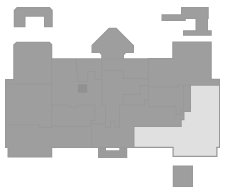 Egyptian ArtFirst Floor
Egyptian ArtFirst Floor |
 |
Fresco, with hunting scene 12th century Spanish Fresco The Cloisters Collection, 1957 (57.97.1) More information: The Collection Online Not on view
|

Medieval Art and The CloistersThe Cloisters at Fort Tryon Park |
 |
Wolf and Fox Hunt ca. 1615–21 Peter Paul Rubens and Workshop (Flemish) Oil on canvas John Stewart Kennedy Fund, 1910 (10.73) More information: The Collection Online Not on view
|
 European PaintingsSecond Floor
European PaintingsSecond Floor |
 |
Plaque of Mithras slaying the bull 2nd or early 3rd century a.d.; Mid-Imperial Roman Bronze Gift of Mr. and Mrs. Klaus G. Perls, 1997 (1997.145.3) More information: The Collection Online Not on view
|
 Greek and Roman ArtFirst Floor and Mezzanine
Greek and Roman ArtFirst Floor and Mezzanine |
 |
Boy with a Greyhound possibly 1570s Paolo Veronese (Paolo Caliari) (Italian) Oil on canvas H. O. Havemeyer Collection, Bequest of Mrs. H. O. Havemeyer, 1929 (29.100.105) More information: The Collection Online Not on view
|
 European PaintingsSecond Floor
European PaintingsSecond Floor |
 |
Carnelian half-barrel ca. 450–400 b.c.; Classical Greek Carnelian Rogers Fund, 1921 (21.88.38) More information: The Collection Online Not on view
|
 Greek and Roman ArtFirst Floor and Mezzanine
Greek and Roman ArtFirst Floor and Mezzanine |
 |
A Greyhound in Profile Facing Left 1549 Virgil Solis (German) Pen and brown ink over graphite The Elisha Whittelsey Collection, The Elisha Whittelsey Fund, 2001 (2001.497) More information: The Collection Online Not on view
|
 Drawings and PrintsSecond Floor
Drawings and PrintsSecond Floor |
 |
Anubis Recumbent statuette Late Period, Dynasty 26–27, 664–404 b.c. Egypt, Memphite Region, Saqqara; includes the Serapeum, Temple deposit, Emery 1966–1967 Limestone, originally painted black Adelaide Milton de Groot Fund, in memory of the de Groot and Hawley families, 1969 (69.105) More information: The Collection Online Not on view
|
 Egyptian ArtFirst Floor
Egyptian ArtFirst Floor |
 |
Falnama (The Book of Omens) Safavid period, 1550s Iran, Qazvin Ink, opaque watercolor, and gold on paper Rogers Fund, 1935 (35.64.3) More information: The Collection Online Not on view
|
 Islamic ArtSecond Floor
Islamic ArtSecond Floor |
 |
Mechanical Dog New Kingdom, Dynasty 18, reign of Amenhotep III, ca. 1390–1353 b.c. Egypt Elephant ivory Rogers Fund, 1940 (40.2.1) More information: The Collection Online Not on view
|
 Egyptian ArtFirst Floor
Egyptian ArtFirst Floor |
 |
Sarcophagus with the contest between the Muses and the Sirens third quarter of 3rd century a.d.; Late Imperial, Gallienic Roman; in the Villa Nero, Rome, about 1640; later, in the Giardino Torrigiani, Florence Pentelic marble Rogers Fund, 1910 (10.104) More information: The Collection Online Not on view
|
 Greek and Roman ArtFirst Floor and Mezzanine
Greek and Roman ArtFirst Floor and Mezzanine |
 |
James Stuart (1612–1655), Duke of Richmond and Lennox ca. 1634–35 Anthony van Dyck (Flemish) Oil on canvas Marquand Collection, Gift of Henry G. Marquand, 1889 (89.15.16) More information: The Collection Online Not on view
|
 European PaintingsSecond Floor
European PaintingsSecond Floor |
 |
Mr. and Mrs. I. N. Phelps Stokes 1897 John Singer Sargent (American) Oil on canvas Bequest of Edith Minturn Phelps Stokes (Mrs. I. N.), 1938 (38.104) More information: The Collection Online Not on view
|
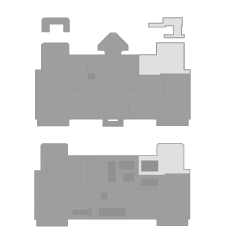 American Paintings and SculptureFirst and Second Floors
American Paintings and SculptureFirst and Second Floors |
 |
The Honorable Henry Fane (1739–1802) with His Guardians, Inigo Jones and Charles Blair 1761–66 Sir Joshua Reynolds (British) Oil on canvas Gift of Junius S. Morgan, 1887 (87.16) More information: The Collection Online Not on view
|
 European PaintingsSecond Floor
European PaintingsSecond Floor |
 |
Hunter with Dog (Jäger mit Hund) ca. 1907/8–14 Anonymous (Austrian); Published by Wiener Werkstätte Color lithograph Museum Accession, transferred from the Library (WW.751) More information: The Collection Online Not on view
|
 Drawings and PrintsSecond Floor
Drawings and PrintsSecond Floor |
 |
Maharana Bhim Singh and Retinue Go to a Hunt ca. 1805–10 Attributed to Chokha (Indian) India (Rajasthan, Mewar or Deogarh) Ink, opaque watercolor, and gold on paper Fletcher Fund, 1996 (1996.100.5) More information: The Collection Online Not on view
|
 Asian ArtSecond Floor
Asian ArtSecond Floor |
 |
Diana and Cupid 1761 Pompeo Girolamo Batoni (Italian) Oil on canvas Purchase, The Charles Engelhard Foundation, Robert Lehman Foundation Inc., Mrs. Haebler Frantz, April R. Axton, L. H. P. Klotz, and David Mortimer Gifts; and Gifts of Mr. and Mrs. Charles Wrightsman, George Blumenthal, and J. Pierpont Morgan, Bequests of Millie Bruhl Fredrick and Mary Clark Thompson, and Rogers Fund, by exchange, 1982 (1982.438) More information: The Collection Online Not on view
|
 European PaintingsSecond Floor
European PaintingsSecond Floor |
 |
Study of a Dog Facing Left 1820–73 Sir Edwin Henry Landseer (British) Graphite Bequest of Mary Cushing Fosburgh, 1978 (1979.135.12) More information: The Collection Online Not on view
|
 Drawings and PrintsSecond Floor
Drawings and PrintsSecond Floor |
© 2011 The Metropolitan Museum of Art |
||

